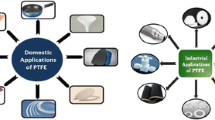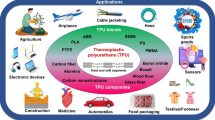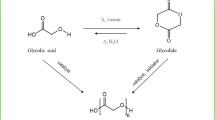Abstract
Cardanol, an excellent monomer for polymer production, has been isolated from CNSL and allowed to react with formaldehyde in a particular mole ratio in the presence of glutaric acid catalyst to give high-ortho novolac resin. Such characterized polyol has been condensed with diphenylmethane diisocyanate to produce rigid polyurethane. A commercially available polyol, polypropylene glycol-2000 (PPG-2000), has also been condensed with diphenylmethane diisocyanate and polyol to produce tough polyurethane. These polyurethanes were characterized with respect to their resistance to chemical reagents and mechanical properties such as tensile strength, percentage elongation, tear strength and hardness. Differential thermal analysis (DTA) and thermo-gravimetric analysis (TGA) were undertaken for thermal characterization.
Similar content being viewed by others
References
Antony R 1993J. Polym. Sci. 31 3187
Balakrishna R S, Satyanarayana M N, Vishwanath B B and Shrisalkar M M 1990J. Appl. Polym. Sci. 41 1365
Denny R C and Sinclair R 1991Visible and ultraviolet spectroscopy (ed.) D Mowthorpe (Singapore: John Wiley) p. 133
Dusek K, Spirkova M and Havlicek I 1990Macromolecules 23 1774
Ghatge N D and Shinde B M 1979J. Elastomers 111 48
Ghatge N D and Vailva S V 1975Die Aggewandte Macromoleculare chemie. 43 1
John G and Pillai C K S 1992Makromol. Chem. Rapid. Commun. 13 255
Knowles A 1984Practical absorption spectrometry (eds) A Knowles and C Burgess (London: Chapman and Hall) p. 10
Madhusudhan V and Murthy B G K 1992Prog. Org. Coat. 20 63
Manjula S, Pillai C K S and Kumar V G 1990Thermochim. Acta 159 255
Manjula S, Pavithran C, Pillai C K S and Kumar V G 1991J. Mater. Sci. 26 4001
Manjula S, Kumar V G and Pillai C K S 1992J. Appl. Polym. Sci. 45 309
Patel M S, Patel V S and Patel R G 1989J. Therm. Anal. 35 47
Petravic J S, Havsky M, Dusek K, Vidakavlic M, Jarni J and Banjammin B 1991J. Appl. Polym. Sci. 12 39991
Pillot J P, Vanthanh M D M, Gerval J and Dunogues J 1989Euro. Polym. J. 25 285
Sathyalekshmi K 1994Polym. Sci. Recent advances (ed.) I S Bhardwajj (New Delhi: Interscience) vol. 2, p. 862
Sathyalekshmi K and Gopalakrishnan S 2000Plastics, Rubber and Composites 29 63
Sood S K, Tyman J H P, Durrani A and Johnson R A 1986Lipids 21 241
Author information
Authors and Affiliations
Rights and permissions
About this article
Cite this article
Mythili, C.V., Retna, A.M. & Gopalakrishnan, S. Synthesis, mechanical, thermal and chemical properties of polyurethanes based on cardanol. Bull Mater Sci 27, 235–241 (2004). https://doi.org/10.1007/BF02708512
Received:
Revised:
Issue Date:
DOI: https://doi.org/10.1007/BF02708512




